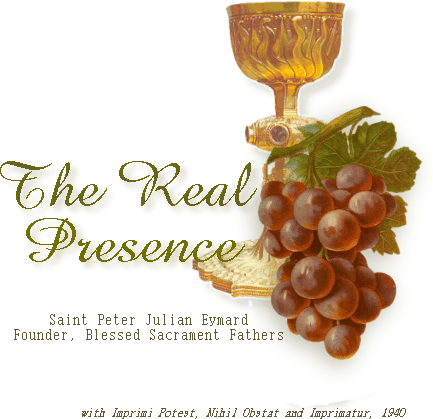

THE SACRIFICES OF JESUS IN THE EUCHARIST
Dilexit me, et tradidit Semetipsum pro me.
He loved me, and delivered Himself for me. (Galatians ii. 20.)
WHAT are the proofs of a genuine love? There is only one, its sacrifices: the sacrifices it prompts us to do and. those it accepts with joy.
Love without sacrifice is but an empty name, a self-love in disguise.
If we would therefore know the greatness of the love Jesus in the Eucharist has for man, if we would estimate the value of this love, we should look into the sacrifices called for by the Eucharist.
They are the same as those of the Passion of the God-Man. Now as then, Jesus Christ sacrifices His civil life, His natural life, and His Divine life.
I
IN HIS Passion, to which His great love for us led Him, Jesus Christ was outlawed. His people disowned Him and calumniated Him; He did not say a word in self-defense. He was delivered into the hands of His enemies without any protection whatsoever. He did not demand for Himself what is the right of the most common defendant. Out of love for His people and for their salvation He sacrificed His rights as a citizen and an honest man.
In the Eucharist Jesus Christ accepts again this immolation of His civil life.
He is there without any rights whatsoever. The law does not give Him recognition. He, God made man, the Savior of the human race, has scarcely a word in the code of the nations He has redeemed. Although He lives in our midst, we do not know Him: Medius vestrum stetit, quem vos nescitis. "There hath stood One in the midst of you, Whom you know not."
He has no social standing. In many countries the Feast of Corpus Christi has been suppressed. Jesus Christ cannot come out or show Himself in public. He must hide Himself; men are ashamed of Him. Non no vi hominem. "I know not the man!"
But who are they that are ashamed of Jesus Christ? Mohammedans? Jews? No, they are Christians!
The Eucharist is without defense, without protection. Provided you do not publicly disturb Divine worship, you may abuse the Eucharist and commit sacrileges with impunity; that is no one's business but your own.
Jesus Christ is then without any protection from man.
Perhaps Heaven will take up His defense? No! Jesus is delivered up by His Father to the caprice of sinners just as He was to Caiphas and Pilate. Tradidit Jesum vero voluntati eorum! "But Jesus he delivered up to their will!"
What! Jesus knew all this when He instituted the Eucharist, and He freely chose this state? Yes, in order to be our Model, our consolation in our sorrows and in the persecutions of the world.
And He will remain in this state even to the end of the world as an example and grace for everyone of His children. He loves us.
II
DURING His Passion, Jesus Christ added to the sacrifice of His civil rights the immolation of everything that was human in Him: the immolation of His will and of the beatitude of His soul, which He allowed to be overwhelmed with sadness unto death; the immolation of His life on the Cross.
It was not enough for His love to have done this once; in the Eucharist He perpetuates this natural death.
In order to immolate His will He, a God, obeys His creature; He, a King, obeys His subject; He, a Liberator, obeys His slave! He obeys priest and people, Saint and sinner. He obeys without making any resistance, without our having to force His obedience. He obeys even His enemies. He obeys everybody with the same promptness.
He obeys not only at Mass when the priest pronounces the words of the consecration, but at every moment of the day and night, whenever the faithful need Him. His permanent state is one of genuine and simple obedience. Is all this really possible?
Oh! If man but understood the love of the Eucharist!
During His Passion Jesus was bound; He lost His liberty. In the Eucharist He is the One that binds Himself. He has chained Himself with the unconditional and perpetual chains of His promises.
He has chained Himself to the Sacred Species to which the sacramental words bind Him inseparably. In the Eucharist as on the Cross or in the Tomb He has no movement, no action of His own, although He possesses within Himself the fullness of the risen life.
He is fully dependent on man like a Prisoner of love. He cannot break His bonds, or leave His Eucharistic prison; He is our Prisoner to the end of time. He pledged Himself to this; His contract of love goes as far as that.
As to His soul's beatitude, Jesus is no longer able, as at Gethsemane, to suspend its raptures and its joys, for He is risen and in glory. But He loses it in man, in the Christian, who is an unworthy member. How often Jesus has to suffer ingratitude and insult! How often Christians imitate the Jews! Jesus wept once over guilty Jerusalem. He loves us much more than He did the Jews, and He is much more afflicted by our sins, by our perdition than by the perdition of the Jews. If Jesus could weep in the Blessed Sacrament, what tears would He not shed!
Lastly, Jesus, Who in the Host is no longer subject to a real death, assumes at least an apparent state of death. The Sacred Species are consecrated separately in order to recall the loss of His Blood which by escaping from His Body brought about His painful death.
He gives Himself in Communion. The Sacred Species are consumed, destroyed in us.
Jesus is also exposed to the loss of His sacramental existence through the profanations of the impious who do away with the Sacred Species.
Sinners who receive Him unworthily crucify Him in their souls, bind Him to the devil, their sovereign master! Rursum crucifigentes sibimetipsis Filium Dei. "Crucifying again to themselves the Son of God."
III
THUS, inasmuch as it is possible for Him in His risen state, Jesus immolates His natural life in the Eucharist. In the Passion He had not spared His Divine life; neither does He spare it in the Eucharist.
In the Passion He revealed nothing of His glory, majesty, and power, but only the man of sorrows, the accursed of God and man. Isaias could not recognize Him on account of the spittle and wounds that defiled His august face!
In the Passion Jesus allowed only His love to appear. Woe to those who did not want to recognize Him! The adoration of His Divinity and the proclamation of His innocence had to come from a robber, a thief; and nature was the only one to mourn its Creator.
In the Blessed Sacrament Jesus continues with a still greater love this immolation of His Divine attributes.
Of all the power and glory of Jesus Christ we see nothing but a patience that would give cause for scandal did we not know that His love for us is infinite, that His love is a folly! Insanis! He is foolish.
This gentle Savior seems to say to us: "Well, am I not doing enough for you? Do I not deserve your love? What more can I do? Try to find what sacrifice there is still for Me to make."
Woe to those that despise so much love! One readily understands that Hell is not too much for them. . . . But let us not think of that. ...The Eucharist is the supreme proof of Jesus' love for us because it is the supreme sacrifice.
 Contact Us
Contact Us
HOME---------------THE HOLY EUCHARIST DIRECTORY-----------------------BLESSED SACRAMENT VISITS
www.catholictradition.org/Eucharist/real-presence12.htm